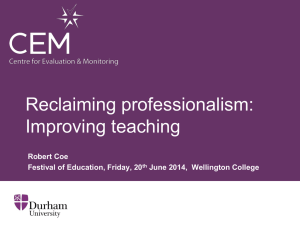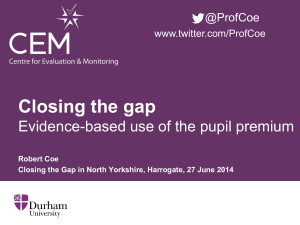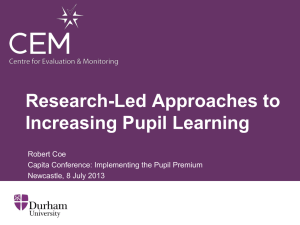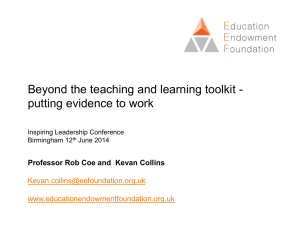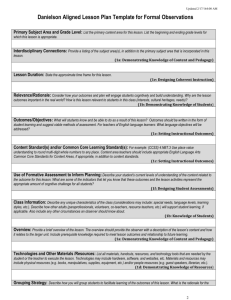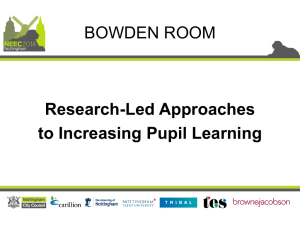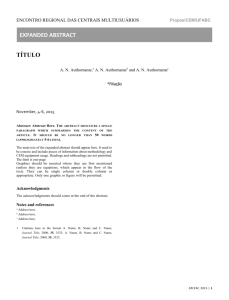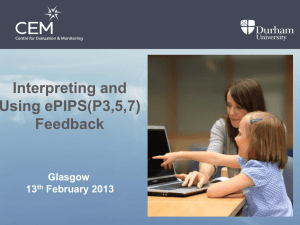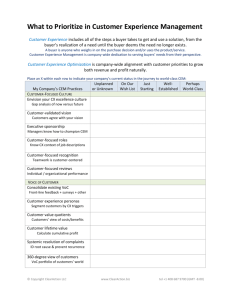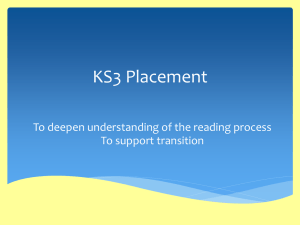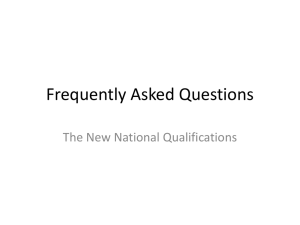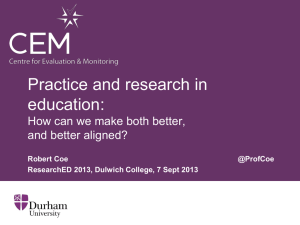Reclaiming our profession: Getting Teaching Better (ppt)
advertisement
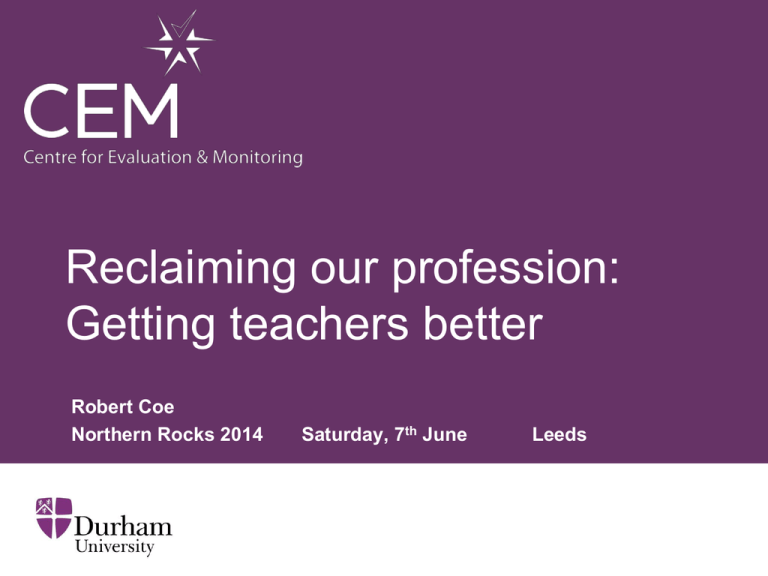
Reclaiming our profession: Getting teachers better Robert Coe Northern Rocks 2014 Saturday, 7th June Leeds Getting teachers better What does ‘better’ look like? ∂ How do we get better? How will we know if we have? 2 What does ‘better’ look like? If you want to be a better teacher, Do you know what aspect of your practice you should work to improve? Do you know what you should do to improve ∂ it? Can you actually do this? How will you know if it has improved? (‘should’ = ‘most likely to lead to benefit’) 4 ∂ 5 Danielson Framework http://danielsongroup.org/framework/ 1. Planning and preparation a. Demonstrating Knowledge of Content and Pedagogy b. Demonstrating Knowledge of Students c. Setting Instructional Outcomes d. Demonstrating Knowledge of Resources e. Designing Coherent Instruction f. Designing Student Assessments 3. Instruction a. Communicating with Students b. Using Questioning and Discussion Techniques c. Engaging Students in Learning d. Using Assessment in Instruction e. Demonstrating Flexibility and Responsiveness ∂ 4. Professional responsibilities a. b. c. d. Reflecting on Teaching Maintaining Accurate Records Communicating with Families Participating in the Professional Community e. Growing and Developing Professionally f. Showing Professionalism 2. Classroom environment a. Creating an Environment of Respect and Rapport b. Establishing a Culture for Learning c. Managing Classroom Procedures d. Managing Student Behavior e. Organizing Physical Space 6 Teacher Professional Standards should Be based on best evidence about pedagogy, teacher effectiveness, learning theory Reflect diversity of teacher needs (one size doesn’t fit all) ∂ Include protocols for demonstrating when they are met that are – Clear and operationalisable – Consistent across different raters, schools, etc – Demonstrably predictive of valued pupil outcomes 7 What we want teachers to learn (good pedagogy) may depend on … Different career stages – Initial – Developing – Expert Different teaching/leadership roles Different subjects – A level history – Early reading – Adult vocational numeracy ∂ Different phases – – – – – Class teacher – Subject leader – Senior leadership Different teaching aims – – – – Cognitive/intellectual Affective/emotional Social Behavioural Early years Primary Secondary FE Different contexts – Social mix – Attainment levels 8 Evidence-based standards for effective teaching? Evidence about relationships between teacher skills, knowledge & behaviours and ‘effectiveness’ Evidence about what can be changed (and how) ∂ Based on ‘best’ theories of – Pupil learning – Pedagogy & teaching effectiveness – Behaviour change (individual, institutional, systemic) Most important: does focusing on these things lead to improvement? 9 Effect Size (months gain) Impact vs cost www.educationendowmentfoundation.org.uk/toolkit Most promising for raising attainment 8 May be worth it Feedback Meta-cognitive Peer tutoring Homework (Secondary) Collaborative Early Years 1-1 tuition ∂ Behaviour Small gp Phonics Parental tuition involvement ICT Social Individualised Summer schools learning Mentoring Homework (Primary) Performance Aspirations 0 pay £0 Ability grouping Cost per pupil Smaller classes After school Teaching assistants £1000 Small effects / high cost Knowledge of research Put these in order of effectiveness: A. A one-to-one numeracy intervention (two 15-minute sessions per week, delivered by teaching assistants) for Year 2-6 pupils who are struggling with numeracy (outcome: maths) B. Nine weekly one-hour sessions where Y7 pupils below L4 read and discuss an age-appropriate book, with tools and resources to encourage reading for pleasure (outcome: ∂ reading) C. A four-week summer school programme (between Y6 & 7) for pupils who had been predicted to achieve KS2 below Level 4b in English, focussed on poetry and writing (outcome: writing). D. Y6 & 7 teachers trained to deliver a programme to help low attaining pupils plan, monitor and evaluate their writing using memorable experiences, eg trips and visitors (outcome: writing). 11 Learning theory In what ways does understanding depend on knowledge? In what ways does knowledge depend on understanding? Give an example of a∂ common misunderstanding of a key concept you have taught. How might you address it? How can teachers make it most likely that students will remember what they have learnt? 12 How do we get better? 13 Broader argument Teacher quality is what matters We need to focus on teacher learning Teachers learn just like other people – Be clear what you want∂ them to learn – Get good information about where they are at – Give good feedback Cultural changes are required to – Help teachers learn from each other – Give teachers ownership of their learning 14 Five Strategies of Formative Assessment (Wiliam 2011 Embedded formative assessment) Clarifying, sharing and understanding learning intentions and success criteria Engineering effective classroom discussions, activities and learning tasks that elicit evidence of learning ∂ Providing feedback that moves learners forward Activating learners as instructional resources for each other Activating learners as the owners of their own learning 15 Clarifying, sharing and understanding learning intentions and success criteria Attempts to describe these are either – Too broad to be well-defined – Too narrow to capture real learning ∂ Must be operationalised with – Examples of behaviours that do / do not exemplify – Specific “tasks that elicit evidence of learning” Therefore need to assess teacher learning – Does not imply evaluation/ranking/consequences 16 How do we get students to learn hard things? Eg Place value Persuasive writing Music composition Balancing chemical equations • Explain what they should do • Demonstrate it • Get them to do it (with ∂ gradually reducing support) • Provide feedback • Get them to practise until it is secure • Assess their skill/ understanding How do we get teachers to learn hard things? Eg Using formative assessment Assertive discipline How to teach algebra • Explain what they should do ∂ What CPD helps learners? Intense: at least 30 contact hours, preferably 50+ Sustained: over at least two terms Content focused: on teachers’ knowledge of subject content & how students learn it ∂ Active: opportunities to try it out & discuss Supported: external feedback and networks to improve and sustain Evidence based: promotes strategies supported by robust evaluation evidence How will we know if we have? 20 Why monitor teaching quality? Strong evidence of (potential) benefit from – Performance feedback (Coe, 2002) – Target setting (Locke & Latham, 2006) – Intelligent accountability (Wiliam 2010) Individual teachers matter most Everyone can improve∂ Teachers stop improving after 3-5 years Judging real quality/effectiveness is very hard – Multidimensional – Not easily visible – Confounded 21 Monitoring the quality of teaching Progress in assessments – Quality of assessment matters (cem.org/blog) – Regular, high quality assessment across curriculum (InCAS, INSIGHT) Classroom observation – Much harder than you think! (cem.org/blog) – Multiple observations/ers, trained and QA’d Student ratings ∂ – Extremely valuable, if done properly (http://www.cem.org/latest/student-evaluation-of-teaching-canit-raise-attainment-in-secondary-schools) Other – – – – – Parent ratings feedback Student work scrutiny Colleague perceptions (360) Self assessment Pedagogical content knowledge 22 Teacher Assessment How do you know that it has captured understanding of key concepts? – vs ‘check-list’ (eg ‘;’=L5, 3 tenses=L7) How do you know standards are comparable? ∂ – Across teachers, schools, subjects – Is progress good? How have you resolved tensions from teacher judgments being used to judge teachers? 23 School ‘improvement’ often isn’t School would have improved anyway – Volunteers/enthusiasts improve: misattributed to intervention – Chance variation (esp. if start low) Poor outcome measures – Perceptions of those who worked hard at it – No robust assessment of pupil ∂ learning Poor evaluation designs – Weak evaluations more likely to show positive results – Improved intake mistaken for impact of intervention Selective reporting – Dredging for anything positive (within a study) – Only success is publicised (Coe, 2009, 2013) Key elements of good evaluation Clear, well defined, replicable intervention ∂ Good assessment of appropriate outcomes Well-matched comparison group Summary … 1. Teacher ‘quality’ needs to be evidence-based www.cem.org 2. Focus on characteristics that help us improve 3. Teachers learn the same way as other people @ProfCoe Robert.Coe@cem.dur.ac.uk 4. Monitoring and evaluation are important, but hard
